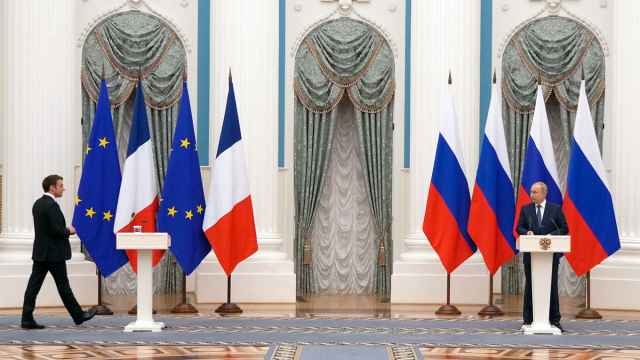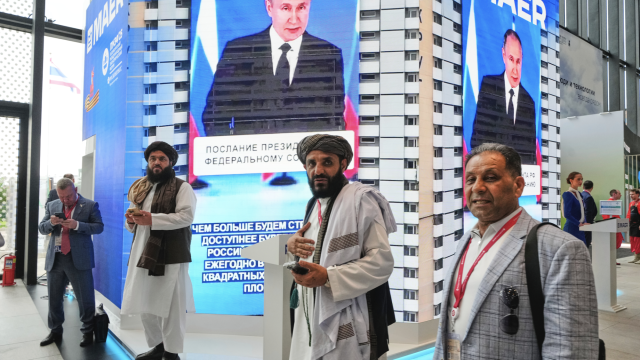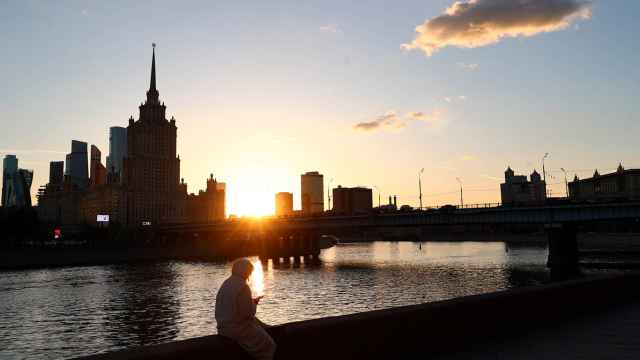President Vladimir Putin in his state-of-the-nation address Wednesday called for legislative amendments simplifying the process of obtaining Russian citizenship, amendments that could allow millions of people to receive Russian passports.
Putin, who has made strengthening national identity one of his political priorities for his third presidential term, said the new legislation should allow Russian speakers and descendants of citizens of the Russian Empire or the Soviet Union to be able to obtain citizenship.
"I ask that a procedure be worked out for granting Russian citizenship to our compatriots, to speakers of the Russian language and bearers of Russian culture, to direct descendants of those who were born in the Russian Empire or the Soviet Union," Putin said.
He added that those who take Russian passports would be required to renounce their current citizenship.
According to current legislation, people can apply for Russian citizenship only if they have permanently resided in Russia for five years and speak Russian. People who don't meet the residency requirement can apply for citizenship if a parent is a Russian citizen who lives in Russia. People without passports who were Soviet citizens are also eligible to get citizenship faster.
The president called the current legislation, which was passed in 2002, during Putin's first term as president, "terribly bureaucratic."
Amendments proposed by Federation Council senators, including Vladimir Dzhabarov, would abolish the five-year residency requirement.
If the amendments are passed, up to 25 million people who live outside the Russian Federation, most of them former Soviet citizens, could receive Russian citizenship, experts say.
It is unclear whether the law would apply to citizens of Poland and Finland, both of which were part of the Russian Empire before the Bolshevik Revolution.
The proposed amendments have met with resistance from nationalist groups, which have said that poorly educated migrants from Central Asian states might use the new law to settle in Russia.
"Russian society will turn into a conglomerate of rival ethnic communities," Daniil Konstantinov, a nationalist member of the opposition Coordination Council, said in an op-ed for the Svobodnaya Pressa online newspaper last month in reference to the bill.
Also in his speech, Putin said that as of 2015, entrance to Russia should be allowed only for people traveling with foreign travel passports instead of internal ones, as is permitted for people from some countries.
"It is practically impossible to establish effective migration control," he said.
The move would mostly affect citizens of former Soviet states who travel to Russia using internal identification documents. As in Russia, in many CIS countries people have separate obligatory internal passports and optional foreign travel passports.
Related articles:
A Message from The Moscow Times:
Dear readers,
We are facing unprecedented challenges. Russia's Prosecutor General's Office has designated The Moscow Times as an "undesirable" organization, criminalizing our work and putting our staff at risk of prosecution. This follows our earlier unjust labeling as a "foreign agent."
These actions are direct attempts to silence independent journalism in Russia. The authorities claim our work "discredits the decisions of the Russian leadership." We see things differently: we strive to provide accurate, unbiased reporting on Russia.
We, the journalists of The Moscow Times, refuse to be silenced. But to continue our work, we need your help.
Your support, no matter how small, makes a world of difference. If you can, please support us monthly starting from just $2. It's quick to set up, and every contribution makes a significant impact.
By supporting The Moscow Times, you're defending open, independent journalism in the face of repression. Thank you for standing with us.
Remind me later.





